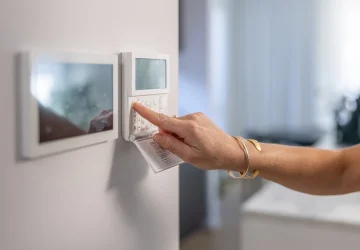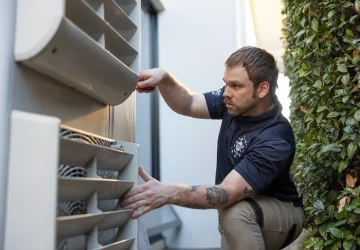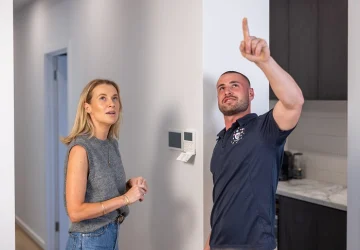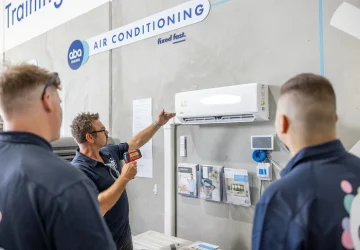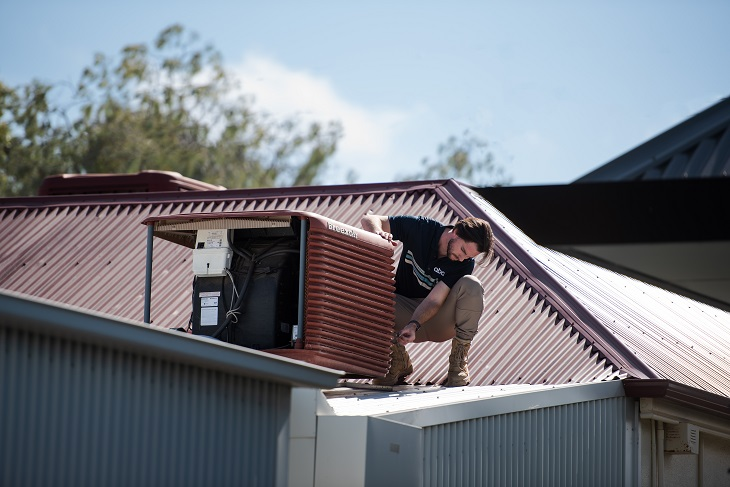
What’s the Difference Between Evaporative Cooling and Air Conditioning?
Keeping your home cool during Australia’s sweltering summers is no small task, and choosing the right cooling system can make all the difference.
If you’re weighing your options, you’ve likely come across two popular choices: ducted air conditioning and evaporative cooling systems. But what’s the difference, and which one is better for your home?
ABA Air Conditioning will help you break down everything you need to know about these two cooling systems, helping you choose the best option based on your climate, budget, and preferences.
What is Ducted Air Conditioning?
Let’s start with ducted air conditioning, a system that’s known for its ability to cool your entire home evenly. So, how does it work?
Ducted air conditioning uses a central unit, typically placed outside or in the roof space, to cool air. This cooled air is then distributed through air conditioner ducting that runs throughout your house, delivering cool air to every room via discreet vents. It’s a great option if you’re looking for a seamless cooling experience without bulky units on the walls.
Benefits of Ducted Cooling
- Consistent Temperature: No more fighting over the temperature between rooms. With ducted aircon, you get uniform cooling throughout your entire house. The days of having one freezing cold room and another hot one are over.
- Better Control: Here’s something that people often overlook: you can zone your home with duct air conditioning. Want your bedroom to stay cool while you’re in the living room? No problem. Zoning allows you to cool only the spaces you’re using, which means you’re saving energy and money.
- Energy Efficiency: While the initial installation cost of ducted air conditioning can be high, the ability to zone your home makes it more energy-efficient in the long run. You’re not wasting energy cooling rooms that you don’t use.
When is Ducted Air Conditioning the Best Choice?
Ducted systems really shine in hotter, humid climates, like many parts of Australia. If your summers are not just hot but also sticky and uncomfortable, ducted aircon does a fantastic job of both cooling and dehumidifying the air. You’ll feel cooler and more comfortable even when humidity is through the roof.
What is Evaporative Cooling?
Now, let’s switch gears and talk about evaporative cooling. Unlike ducted air conditioning, evaporative air conditioning works by cooling air through the natural evaporation process. Warm air from outside is drawn into the system and passed through water-soaked pads, which cool the air. The now-cooled air is then circulated throughout your home.
This system is ideal for those who prefer fresh air as it constantly pulls in new air from outside rather than recirculating the same indoor air.
Benefits of Evaporative Systems
- Eco-Friendly: Evaporative air conditioning is known for being a more environmentally friendly option. Since it uses water rather than chemical refrigerants to cool the air, it has a smaller carbon footprint. Plus, it consumes far less electricity than traditional air conditioning systems.
- Cost-Effective: When it comes to energy bills, evaporative air coolers are a winner. Not only are they cheaper to run, but they also have lower installation costs compared to ducted air conditioning systems.
- Fresh Air Circulation: One of the best things about evaporative cooling systems is the constant supply of fresh, cool air. Because it draws air from outside, you’re not stuck breathing in the same recycled air that can feel stale with traditional air conditioners.
Best Use Cases for Evaporative Cooling
Evaporative cooling thrives in dry climates, making it perfect for inland areas where humidity levels are low. However, if you live in a more humid coastal region, this system might not be as effective since the cooling relies on evaporating moisture into the air.
Making the Right Choice for Your Home With ABA Air Conditioning
When it comes to keeping your home cool, both ducted air conditioning and evaporative cooling have their advantages.
If you live in a humid area and want full control over your home’s temperature, ducted aircon is likely your best bet. On the other hand, if you live in a dry climate and want an eco-friendly, cost-effective solution, evaporative cooling might be perfect for you.
Ducted air conditioning offers more power and control, while evaporative cooling shines in terms of efficiency and eco-friendliness, especially in dry climates.
So, whether you’re considering air conditioning installation in Adelaide or elsewhere, these differences can help you decide which system is right for your home.
Ready to make a choice?
Contact ABA Air Conditioning for expert advice and air conditioning installation in Adelaide. Get a quote today or book an in-home consultation to find the perfect cooling solution for your home.
FAQs
How does evaporative cooling work in comparison to air conditioning?
Evaporative cooling works by pulling warm air through water-soaked pads to cool it, while air conditioning removes heat and humidity from the air using refrigerants. Evaporative cooling is better suited for dry climates, while air conditioning performs well in both dry and humid areas.
Is ducted air conditioning worth it in Australia?
Yes, especially in areas with both high temperatures and humidity. Ducted aircon offers consistent, powerful cooling throughout your home and can handle the intense Australian summers with ease.
Can I switch between ducted aircon and evaporative cooling?
Unfortunately, no. These systems are built differently, so you’ll need to choose one that best fits your needs. If you live in a dry area, evaporative cooling might be more efficient. If you’re dealing with humidity, ducted air conditioning is the better option.

